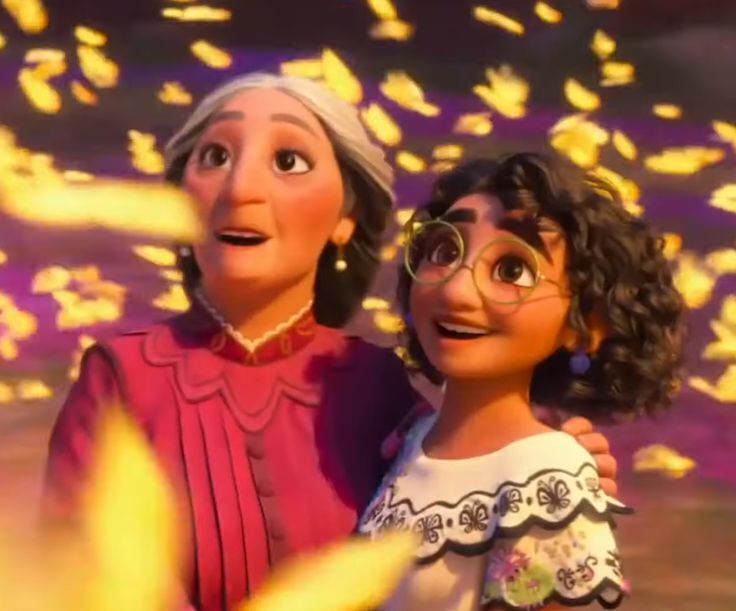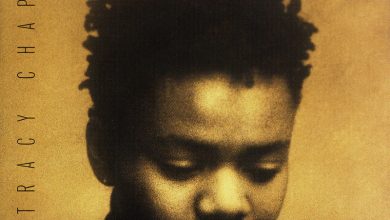“Encanto” – An Unlikely Disney Story

Still from “Encanto” from Disney+
Image Description: Mirabel Madrigal (right) and Abuela (left) embrace before a cluster of yellow butterflies.
It was week two when my roommates and I played “Encanto’s” nationally beloved song “We Don’t Talk About Bruno” three times into the night. Even as week six has tumbled into our lives, the obsession has yet to stop. Nonetheless, Lin Manuel-Miranda’s musical genius is not the only thing that drew my roommates and many other viewers into its colorful trance.
“Encanto,” one of Disney’s newest films, was released in November of last year and has since then won many awards including Golden Globe’s Best Animated Feature Film. The film follows protagonist Mirabel Madrigal as she attempts to discover the reason why the magic that holds her community and family home together has been faltering. The film is saturated with stunning, vibrant animation and pop-like Colombian music. These aspects paint a colorful backdrop to an unlikely story of ongoing conflict, displacement, and generational trauma — a story that has left my friends and I wracked with tears even after the second and third watch-through.
The magic was given to Mirabel’s Abuela, Alma Madrigal, when a group of soldiers drove Alma and her kids out of their home and killed her husband in the process. The magic manifests itself into a candle, becoming the center of where an entirely new community grows: an Encanto. After my first watch of the movie, I had thought of the soldiers as nothing more than colonizers. Yet, as various TikTokers came to point out following the film’s release, the soldiers also represent an ongoing conflict in Colombia that has led the country to have one of the highest numbers of internally displaced peoples.
In 2016, a PBS BYKIDS film documentary titled “Displaced But Not Defeated,” follows the story of Maria Ceballos, a young Colombian girl who has an experience much like Abuela Alma in Encanto. After guerrilla groups invaded her hometown, Maria’s father was killed. They were forced to move for safety, trekking between various settlements, most of which were often removed by police. Maria’s story reflects the painful experience of many Colombian communities that have been forcefully removed from their land.
For forty years, a civil war has plagued Colombia between the state’s army, left-wing guerilla groups, right-wing paramilitary, and drug cartels. Colombia’s drug economy has fueled the expansion of these groups and has sustained the conflict. The United States has previously intervened to solve this ongoing crisis. With hopes of advancing their “war on drugs,” the U.S. has sent millions of dollars of military aid to Colombia. Yet, with the U.S.-funded Plan Colombia, more Colombians have been driven from their homes than at any other point in the conflict, with increasingly high numbers of civilian casualties (Grandin 2016).
Unfortunately, this warfare has disproportionately impacted the working-class population of Colombia, especially within Indigenous and Afro-Colombian communities who are continuously displaced from their homes as more and more towns turn into stages for violent skirmishes. According to the Council on Foreign Relations, over 5 million Colombians have become internally displaced. Nonetheless, this violence is virtually invisible in middle-class and upper-class neighborhoods of major Colombian cities.
In “Displaced But Not Defeated,” Maria Ceballos has a chance to illuminate the viewers on the often brutal experience of displaced Colombians. Directed by Maria herself, she also presents to the viewers how her family has prevailed in the face of violence and poverty with dancing, singing, and musicals that portray a deep love for their country and their family. “Like everyone says,” Maria expresses. “I want peace for Colombia. It is everybody’s wish.”
Mirabel and the Madrigals demonstrate a much brighter story for Colombian families. The candle came to Abuela when she was a young woman who had just tragically lost her husband and her home, leaving her alone with three newborns. As Mirabel scrambles to understand what is happening to the lost magic, Abuela could only see that what had kept her safe, the magical manifestation of her lost husband, was disappearing. It isn’t until Abuela is able to open up to Mirabel about the true pain of her history that the family is able to heal.
Tori DeAngelis in her article “The Legacy of Trauma” explains that intergenerational trauma was first studied amongst children of Holocaust survivors who exhibited higher rates of psychological distress. The research has expanded to include various other populations that have undergone distressing circumstances, like generations of Native Americans who were forced to assimilate through residential schools and current generations of African Americans.
“Encanto” begins to offer insight into the interpersonal relationships and the healing necessary for the trauma of being uprooted from your home without much assistance in sight, a pressure that is nonetheless passed down through the family. Many scholars indicate that parents fear personal disclosure and often pass on “survivor messages” to their children, even when threats are no longer present. For instance, due to the historical mistreatment of the Black community and other marginalized communities by hospitals, a parent might maintain and pass on a rightful mistrust of the medical system despite increasing social awareness of systemic injustices and attempts at improvement. Characteristics of this anxiety present themselves within the conflict between Abuela and Mirabel.
Because Abuela had yet to truly share the painful scope of her experience–the isolation and helplessness–Mirabel does not understand Abuela’s need to ignore what’s happening to the magic. Instead, she sees Abuela’s incessant need for perfection hurting the family. Yet, when Mirabel finally understands Abuela’s story, she sees a young mother trying to grasp onto magic–a safe haven–that she has no idea why or how she obtained. Abuela believed that in order to earn this magic the family had to exercise their gifts to great lengths and help the community, even at the expense of the family’s emotional and physical health.
Unlike the neat resolution of Encanto, Colombia continues to deal with this enduring conflict. These internal conflicts have lasting consequences, often befalling the most vulnerable populations such as people of color and impoverished communities. What cannot be solved with music and dancing can be solved with solidarity and uplifting the communities most impacted by the conflict in Colombia. Mikki Kendall in her book “Hood Feminism,” argues that we “rarely talk about basic needs as a feminist issue. Food insecurity and access to quality education, safe neighborhoods, a living wage, and medical care are all feminist issues.” Being conscious of these issues is a step towards real solidarity that gives young girls like Maria Ceballos and the others in her life an opportunity at a happy and healthy life that was awarded to Mirabel at the close of Encanto–an opportunity that is often awarded to many others who do not live under the constant threat of violence and displacement.




